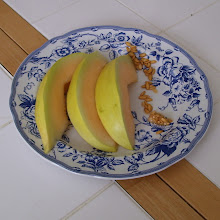When I studied biology, I used to think a lot about what kinds of experiments I wanted to do. I wanted to study the intricacies of the central dogma of molecular biology (DNA->RNA->protein). Yet I came up with few experiments. It's much easier to have a given question and design experiments to answer it.
Researching a given question is what I did in my undergraduate lab internships. I didn't allow myself to think much about how important I thought worm defecation was to the world when I aspired to work in a lab studying the process. I decided that the question didn't matter. In my view, science was about how cleverly and thoroughly people went about answering their questions. "It's not what you do; it's how you do it." The so-called elegance of an experiment was what interested me.
In the popular science articles I read, experimental design gets very little mention. Not the original questions, not the scientific methods, but the results are what the stories describe.
Now my assignment is to come up with several news story ideas. In one case, the ideas have a given, broad topic (climate change); in the other, any scientific topic is fair game. I find myself reading websites about climate change and getting background information and asking myself lots of questions. But unlike in my idyllic, imagined scientific world, in journalism, all questions are not created equal. I can't just pick a random research paper and analyze it to death. A mediocre experiment about HIV will mean more to readers than a clever experiment about periodic pooping in roundworms. What I choose to write about matters.
I haven't come up with any story ideas for the class where I can write on any topic because I haven't picked a topic yet! I could write about anything, and that makes it hard to choose a topic.
I might like to write something about the various consequences of glacial melting. I'm interested in how reduced salinity in the ocean water near the surface would affect ocean levels and levels of ocean ice. On one hand, the melting of freshwater glaciers would raise the sea level. But decreasing the salinity of the ocean's surface would make that water freeze at higher temperatures. A higher freezing point would counteract the melting of ice on the ocean surface: because the glaciers melt, the ocean water is more likely to freeze at a given temperature. So on one hand, global warming may be causing the ocean's ice to melt, but glacial melting could actually counteract the melting of the ice in the ocean, even if that effect is small.
So for what it's worth, my scientific mind thinks about this stuff. But what of all that thinking, by me and by other scientists, would make a good story idea? That's harder to decide. It's also about being analytical but in a creative way.
I wish I could just draw a story out of a hat or pick from a list the way I did when I wrote for The Somerville News and me being free the night of an event was reason enough to cover it.
Subscribe to:
Post Comments (Atom)

No comments:
Post a Comment